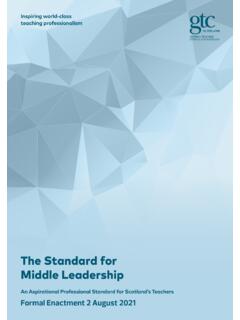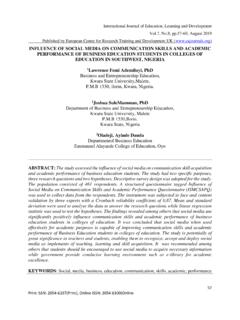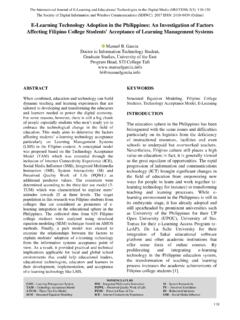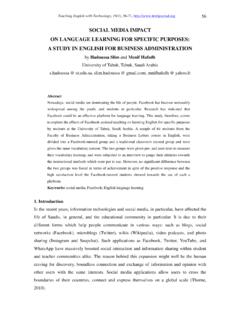Transcription of Professional Guidance on TEACHING COUNCIL FOR …
1 Professional Guidance on THE GENERAL. THE GENERAL. TEACHING COUNCIL . FOR SCOTLAND. TEACHING COUNCIL . the Use of Electronic Communication and social media Purpose of Professional Guidance The increasing popularity of social media in recent years has allowed many teachers to enhance their classroom practice, introducing their pupils to new tools and delivering the curriculum in innovative and engaging ways. The majority of teachers using these tools do so without encountering any difficulty. However, registered teachers and those who may be seeking registration in the future, (such as student teachers), should be aware of the many challenges and ramifications associated with the use of electronic communication and social media .
2 This Professional Guidance will help identify potential dangers, offer some Guidance about how to avoid them and provide a context for responsible, Professional use of electronic communication and social media . Reference to online communications and social media include software, applications (including those running on mobile devices), e-mail and websites, which enable users to interact, create and exchange information online . Examples include, but are not limited to, sites such as Facebook, Twitter, LinkedIn, YouTube, Wikipedia and MySpace.
3 Also included is the use of SMS and instant messaging clients, such as, MSN. Messenger and BBM. GTC Scotland, Clerwood House, 96 Clermiston Road, Edinburgh, EH12 6UT. Tel. 0131 314 6000, Fax. 0131 314 6001, E-mail. ORG. UK. First Principles This Guidance should be read with reference to The Code of Professionalism and Conduct (CoPAC) and the Student Teacher Code (STC) of GTC Scotland ( the Codes'). which set out the key aspects of teacher professionalism. Maintaining the public's trust in the individual teacher and in TEACHING as a profession sits at the heart of being fit to teach, and this can be undermined not only by behaviour occurring in a teacher's Professional life, but also within their private life, including activity online .
4 New Contexts for TEACHING and Learning From e-mail to text and from blogging to tweets, technology is becoming an ever-present in our lives and an increasingly essential tool in the classroom. These new technologies open up a whole range of possibilities to help pupils, and others involved in their education; they provide new access to assignments and resources, connect classrooms in other communities and countries in ways unthinkable only a few years ago. The ability to communicate in real time with others and access networks across the world brings with it great opportunities for teachers.
5 It also offers great challenges as the boundary between teacher and pupil can quickly become blurred. These days all professions are subject to wide scrutiny and it can be hard to tell the difference between perception and reality. The views of teachers on their own profession are important and are at the centre of a self-regulating profession. However, the perspective of parents and the understandable fears of the wider public about inappropriate use of the internet also have to be considered; and these views can sometimes be shaped by sources which are unpredictable - including the media .
6 Teachers therefore need to be alert to the risk that actions which might, on the face of it, seem quite innocent can be misunderstood and misconstrued by others. Private versus Professional As the GTCS Codes state, teachers are individuals with private lives, however, off- duty conduct matters and may have bearing on their Professional life. Therefore sound judgement and due care should be exercised as conduct which may not directly relate to pupils may be relevant to a teacher's fitness to teach. Professional Vulnerability A teacher can be vulnerable to unintended misuses for electronic communication.
7 E-mail, texting and social media encourage casual dialogue and very often, very innocent actions can easily be misconstrued or manipulated. Electronic messages are not anonymous and can be tracked and live forever on the internet. social media sites archive content posted, even when deleted from online profiles. Once information is placed on line , the author relinquishes control of it. social media brings with it a new dimension and feel' to a relationship and this is particularly important when a student and a teacher become friends' in an online environment.
8 A teacher should never share information with students in ANY. environment that they would not willingly or appropriately share in a school or school-related setting or in the community. The Legal Implications The Codes draw attention to the potential impact of criminal convictions on registered teachers and those wishing to become registered. Unwise behaviour online can also result in criminal action or in some cases, civil action brought by others and therefore requires caution. Fitness to Teach Implications At the heart of GTCS's Fitness to Teach framework is the protection of children and young people and vulnerable adults and the trust the public has in the TEACHING profession.
9 Therefore all complaints are considered fairly and in the same way regardless of whether or not they are associated with the internet or involve electronic communication. For example the behaviours listed below have warranted disciplinary measures: inappropriate electronic communication with pupils, colleagues and parents/carers, including SMS and instant messaging;. posting/sending sexually explicit pictures/images to colleagues or pupils;. grooming - whereby a teacher uses electronic messages with a view to establishing an inappropriate relationship with a pupil.
10 Possessing, making, viewing or distributing indecent images of children;. using inappropriate YouTube content in the educational setting. How can teachers minimise risk when using electronic communication and social networking? As a teacher you should: always maintain a formal and courteous and Professional tone in communicating with pupils and ensure that Professional boundaries are maintained;. only use official channels of communication GLOW and work e-mail addresses and be aware of and comply with employer's policies and Guidance ;. not exchange private text, phone numbers, personal e-mail addresses or photos of a personal nature with pupils.








